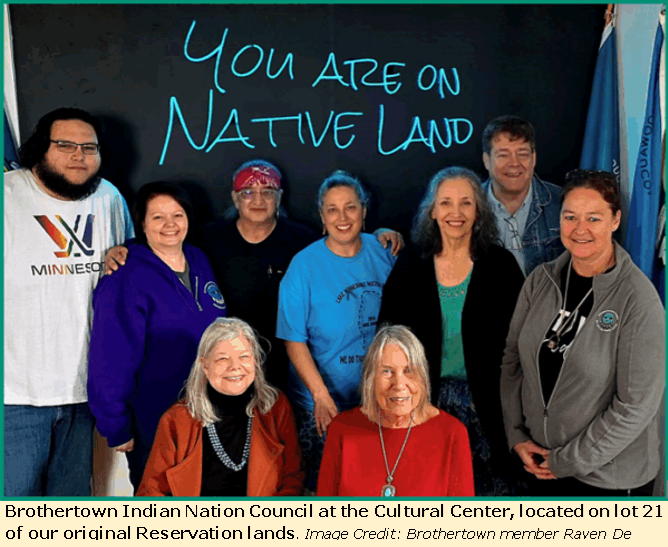Tribal Council

When the Brothertown first came together, it was decided that a form of “town government” would be used to guide the Tribe. However, long-held customs strongly influenced this different approach to governance. It never looked exactly like “town government”, but evolved over many generations and a number of moves by the Tribe, and has continued to evolve. The four officers and five members of the Council are now elected by the membership at large.




- To contact the Council: Each Council member’s email is available by clicking on their names listed below:
- Chair: Phyllis Tousey (2025)
- Vice-Chair: Jessica Ryan (2027)
- Secretary: Melissa Kavonius (2026)
- Treasurer: Michelle Wood (2025)
- Councilmembers: Skip Blanc (2026), Dawn Kraintz (2027), Faith Ottery (2026), Will Ottery (2027), Hector Marroquin (2025).
In addition to their Council responsibilities, officers and members hold leadership and liaison roles in other areas, including cultural and historical preservation, economic development, enrollment, natural resources, operations, government outreach, communications, and strategic planning.
Council Meeting Minutes for enrolled members are available here.
Restoration Petition Support: If you’d like to help, you may share this petition (download here) with friends and family, or at events. Please return signed petitions to the Brothertown Office (PO Box 2206, Fond du Lac, WI 54936).
Other Contacts:
Courtney Cottrell: Tribal Historic Preservation Officer (THPO) and Researcher Liaison.
The founding of the Brothertown and its government in New York
The Brothertown Indians were among the first settlers and established a town called “Brothertown” on lands given by the Oneida peoples in New York. Their original lands are what now covers the Town of Marshall and the southern parts of the Town of Kirkland. The Brothertown Indian Nation was and is a culturally distinct, politically independent tribe; it began as a unique communal vision.
The New England Christian Indians felt it was time to formally organize into their new community, so in 1785, they named themselves Brothertown or Ee-yam-quittoo-wau-connuck*, because they intended to live in brotherhood and harmony the rest of their lives. They adopted a government much like the New England settlers, particularly Connecticut, which they felt would give them more autonomy and independence. They elected officers, such as peacemakers, fence-viewers, overseers of the poor, and two marshals. There were very strict rules regarding profanity, intoxication, adultery, neglect of children, theft, and idleness. Samson Occom was their spiritual leader. To this day, their governance is still based on brotherhood, harmony, and working for the good of the community, and is led by the council and peacemakers.
(*excerpts included from Marshall Historical society, written by historian Janet Dangler, ** spelling taken by the Council from Occom’s original journal in his own hand, referenced in William DeLoss Love‘s book published in 1899 – “Samson Occom Journal 1785 October4 to 1786 December 4” source: Occom Circle, Dartmouth College.) Also, referenced 100 years later in William DeLoss Love‘s book published in 1899, “Samson Occom and the Christian Indians of New England“

